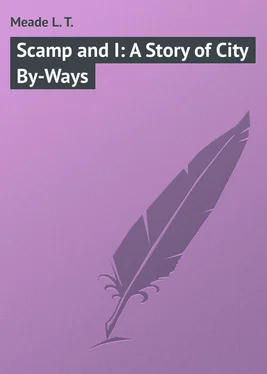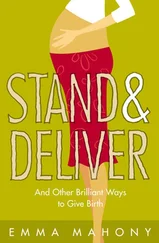L. Meade - Scamp and I - A Story of City By-Ways
Здесь есть возможность читать онлайн «L. Meade - Scamp and I - A Story of City By-Ways» — ознакомительный отрывок электронной книги совершенно бесплатно, а после прочтения отрывка купить полную версию. В некоторых случаях можно слушать аудио, скачать через торрент в формате fb2 и присутствует краткое содержание. Жанр: foreign_prose, foreign_children, на английском языке. Описание произведения, (предисловие) а так же отзывы посетителей доступны на портале библиотеки ЛибКат.
- Название:Scamp and I: A Story of City By-Ways
- Автор:
- Жанр:
- Год:неизвестен
- ISBN:нет данных
- Рейтинг книги:3 / 5. Голосов: 1
-
Избранное:Добавить в избранное
- Отзывы:
-
Ваша оценка:
- 60
- 1
- 2
- 3
- 4
- 5
Scamp and I: A Story of City By-Ways: краткое содержание, описание и аннотация
Предлагаем к чтению аннотацию, описание, краткое содержание или предисловие (зависит от того, что написал сам автор книги «Scamp and I: A Story of City By-Ways»). Если вы не нашли необходимую информацию о книге — напишите в комментариях, мы постараемся отыскать её.
Scamp and I: A Story of City By-Ways — читать онлайн ознакомительный отрывок
Ниже представлен текст книги, разбитый по страницам. Система сохранения места последней прочитанной страницы, позволяет с удобством читать онлайн бесплатно книгу «Scamp and I: A Story of City By-Ways», без необходимости каждый раз заново искать на чём Вы остановились. Поставьте закладку, и сможете в любой момент перейти на страницу, на которой закончили чтение.
Интервал:
Закладка:
Her mother had taught her the trade, and she was really a skilful little work-woman.
Comforted now by her good meal, by her run in the open air, by the wonderful sights, and by the crowning sight of all she had seen; comforted also not a little by Scamp’s company, she resumed her employment.
The dog, satisfied and well pleased, rolled himself up as close as possible to her ragged gown, and went to sleep; and Flo, feeling sure that she would be now undisturbed, arranged quite a nice amusement for herself.
She would begin supposing now in earnest.
She had seen the queen, she had seen fine ladies, she knew at last what velvet and silk, what lace and feathers, what horses and carriages were like. She could suppose to any amount. She had no longer need to draw wholly on her own resources, she knew what the real things were, at last.
She had a very vivid imagination, and she dropped her work, and her big brown eyes looked far away from the real and ugly things about her, to beautiful things elsewhere. But somehow, and this was strange, unpleasant thoughts would intrude, a present anxiety would shut away imaginary joys, and with a sigh the little girl resumed her work and her cares.
Her trouble was this. What railed Dick? His embarrassment, his fear of the police, his forced mirth, had none of them escaped Flo’s observant eyes.
Generally he was the merriest little fellow in the world, but to-night, even while partaking of a supper that would have rejoiced any heart, even while eating those exasperatingly delicious morsels, he had been grave, subdued, and his laugh (for through it all he laughed constantly) had no true ring in it. He was also the bravest little boy possible; he had never in all his life funked any one or anything, and yet to-night at the sight of a policeman even in the far distance he had got in the most cowardly way behind Jenks.
There was some cause for this. There was also something else to be accounted for.
How was that supper bought? Where had the money come from? Flo knew well that ’ot roast goose, with sage and onions, with taters and gravy, not to make any mention of the bowl that held them, had not been purchased for a few pence; so where, where had the money come from?
Dick had it not, and Jenks, though werry liberal, liberal to the amount of now and then presenting her with a whole red herring for their supper, was to all appearance as poor and as hard up as themselves.
True, Flo did not know how Jenks made his living; his trade – for he told her he had a trade – was a secret, which he might enlighten her about some time, but certainly not at present.
Jenks got his money, what little money he had, in some mysterious way, of that there was no doubt.
She thought over it all to-night, and very grave were her fears and suspicions.
Was it possible that Jenks was a bad boy, and that he was teaching Dick to be a bad boy?
Was it possible that Jenks was not honest, and that the delicious supper they had just eaten was not honestly come by?
What a pity if this was so, for ’ot roast goose was so good. Perhaps Dick had helped some old lady to find a cab, and she had given him a shilling, and perhaps Jenks, who was werry good-natured, had kindly assisted some other body, and thus earned ’arf-a-crown; this sum would pay for their supper, good as it was!
But no; had they earned the money in that way, they would have told Flo, they would have been proud to tell Flo, whereas the word money had never been mentioned at all between them!
Had Dick got the money rightly he would have been only too glad to speak of it; so it was clear to Flo that in some wrong manner alone had it come into his possession!
Well! why should she care? They were very poor, they were as low down in the world as they well could be; nobody loved them, nobody had ever taught them to do right. Dick and Flo were “horfans,” same as Scamp was an orphan. The world was hard on them, as it is on all defenceless creatures. If Dick could “prig” something from that rich and greedy world that was letting them both starve, would it be so very wrong?
If he could do this without the police finding out, without fear of discovery, would it not be rather a good and easy way of getting breakfasts, and dinners, and suppers? For surely some people had too much; surely it was not fair that all those buns and cakes, all those endless, countless good things in the West End shops should go to the rich people; surely the little hungry boys and girls who lived, and felt, and suffered in the East End should have their share!
And if only by stealing they could taste roast goose, was it very wrong, was it wrong at all to steal?
Flo knew nothing about God, she had never heard of the eighth commandment, but nevertheless, poor ignorant little child, she had a memory that kept her right, a memory that made it impossible for her, even had she really starved, to touch knowingly what was not her own.
The memory was this.
A year ago Flo’s mother had died in this cellar. She was a young woman, not more than thirty, but the damp of the miserable cellar, together with endless troubles and hardships, had fanned the seeds of consumption within her, and before her thirty-first birthday she had passed away. She knew she was dying, and in her poor way had done her best to prepare her children for her loss. She taught them both her trade, that of a translator, – not a literary translator, poor Mrs Darrell could not read, – but a translator of old boots and shoes into new; and Flo and Dick, young as they were, learned the least difficult and lighter parts of the business before her death. She had no money to leave them, no knowledge beyond that of her trade; she knew nothing of God or of heaven, but she had one deeply-instilled principle, and this she endeavoured by every means in her power to impart to the children.
Living in a place, and belonging to a grade of society, where any honesty was rare, she was nevertheless a perfectly honest woman. She had never touched a penny that was not her own, she was just and true in all her dealings. She was proud of saying – and the pride had caused her sunken, dying eyes to brighten even at the last – that none of her belongings, however low they had fallen, had ever seen the inside of a prison, or ever stood in a prisoner’s dock. They were honest people, and Dick and Flo must keep up the family character. Come what might, happen what would, they must ever and always look every man in the face, with the proud consciousness, “I have stolen from none.”
On the night she died, she had called them both to her side, and got them to promise her this. With pathetic and solemn earnestness, she had held their little hands and looked into their little faces, and implored of them, as they loved their dead father and mother, never, never to disgrace the unstained name they had left to them.
“’Tis just hevery think,” said the dying woman. “Arter hall my ’ard life, ’tis real comfa’ble to look back on. Remember, Dick and Flo, I dies trustin’ yer. You’ll never, wot hever ’appins, be jail-birds – promise me that?”
“Never, mother,” said Flo, kissing her and weeping; and Dick promised, and kissed her, and wept also, and then the two children climbed up on the bed and lay down one at each side of her, and the poor dying woman closed her eyes and was cheered by their words.
“Is you dying to-night, mother?” asked Flo, gazing with awe at her clammy cold face.
“Yes, dearie.”
“Where’ll you be to-morrer, then, mother?”
A shadow passed over the peaceful, ignorant face, the brown eyes, so like her little daughter’s, were opened wide.
“Oh! I doesn’t know – yes, it be werry dark, but I guess it ’ull be all right.” Then after a pause, very slowly, “I doesn’t mind the grave, I’d like a good bit o’ a rest, for I’m awful – awful tired.”
Читать дальшеИнтервал:
Закладка:
Похожие книги на «Scamp and I: A Story of City By-Ways»
Представляем Вашему вниманию похожие книги на «Scamp and I: A Story of City By-Ways» списком для выбора. Мы отобрали схожую по названию и смыслу литературу в надежде предоставить читателям больше вариантов отыскать новые, интересные, ещё непрочитанные произведения.
Обсуждение, отзывы о книге «Scamp and I: A Story of City By-Ways» и просто собственные мнения читателей. Оставьте ваши комментарии, напишите, что Вы думаете о произведении, его смысле или главных героях. Укажите что конкретно понравилось, а что нет, и почему Вы так считаете.












